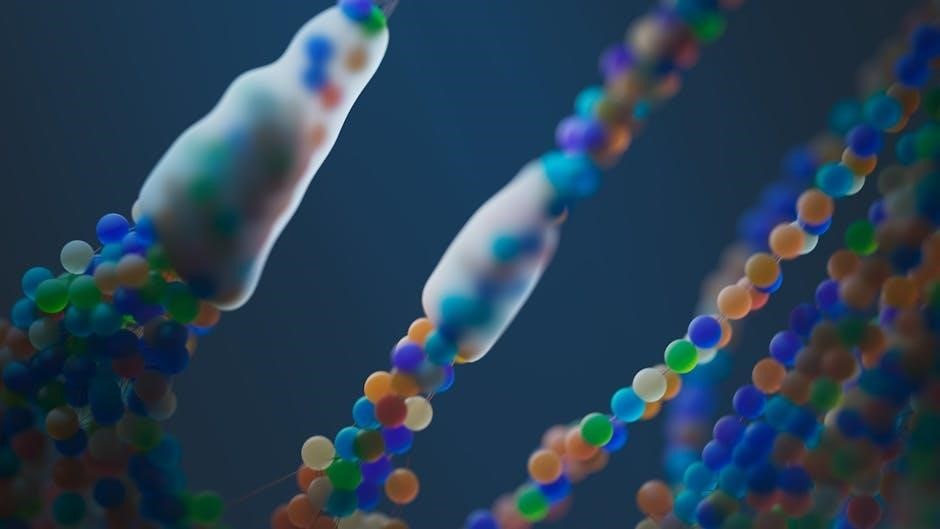The organic chemistry lab is where theoretical concepts transform into practical skills, offering students hands-on experience with techniques, safety protocols, and instrumentation essential for success.
1.1 Importance of the Organic Chemistry Lab
The organic chemistry lab is crucial for mastering practical skills, safety protocols, and instrumentation. It bridges theoretical knowledge with hands-on experience, enabling students to understand carbon-based compounds and their reactions. This lab fosters problem-solving, critical thinking, and collaboration, essential for future careers in chemistry. It prepares students to handle real-world challenges and conduct precise, safe experiments.
1.2 Basic Lab Setup and Safety Protocols
The organic chemistry lab requires a well-organized setup, including essential glassware, instruments, and personal protective equipment (PPE). Safety protocols are paramount, emphasizing proper handling of hazardous chemicals, waste disposal, and emergency preparedness. Students must adhere to guidelines for lab notebooks, goggles, and lab coats. This foundation ensures a safe, efficient, and productive learning environment, fostering confidence in executing experiments.
Essential Safety Protocols in the Organic Chemistry Lab
Safety goggles, lab coats, and proper handling of hazardous chemicals are critical. Protocols include emergency preparedness, waste disposal, and adherence to lab rules to minimize risks.
2.1 Personal Protective Equipment (PPE)
Essential PPE includes safety goggles, lab coats, and gloves to protect against chemical splashes, spills, and broken glass. Proper use ensures safety from skin irritation and eye damage, emphasizing lab protocols. Regular inspection and maintenance of PPE are crucial for effectiveness, while adherence to lab rules prevents accidents, fostering a secure environment for experimental work.
2.2 Handling Hazardous Chemicals and Waste Disposal
Proper handling of hazardous chemicals involves understanding their risks, using appropriate containers, and following safe storage guidelines. Dispose of waste according to lab regulations, separating chemical and organic waste. Neutralize acids/bases before disposal and use designated containers for broken glass. Emergency protocols, such as spill kits, must be readily available to minimize risks and ensure environmental compliance.

Fundamental Techniques in Organic Chemistry Lab
Mastering distillation, filtration, and chromatography is crucial for isolating and purifying compounds. These techniques, along with microscale methods, enhance efficiency and minimize waste in organic chemistry experiments.
3.1 Distillation, Filtration, and Crystallization
Distillation, filtration, and crystallization are core techniques in organic chemistry labs. Distillation separates compounds based on boiling points, filtration removes impurities, and crystallization purifies substances. These methods are essential for isolating and purifying organic compounds. The survival manual provides detailed guidance on performing these procedures safely and effectively, emphasizing proper setup, safety precautions, and waste handling to ensure successful experimental outcomes.
3.2 Chromatography and Spectroscopy Basics
Chromatography and spectroscopy are essential analytical techniques in organic chemistry. Chromatography separates mixtures based on compound interactions, while spectroscopy identifies molecular structures. The survival manual explains fundamentals of TLC, column chromatography, and spectroscopic methods like IR, NMR, and UV-Vis. These tools enable precise compound analysis, aiding in identification and purification. The manual provides practical guidance for mastering these critical lab skills.

Common Lab Instruments and Equipment
Common lab instruments include Bunsen burners, Erlenmeyer flasks, round-bottom flasks, condensers, and separatory funnels. Essential equipment like chromatography columns and rotary evaporators are also frequently used. The survival manual provides detailed descriptions and operational guidance for these tools, ensuring students are familiar with their proper use and maintenance in the organic chemistry lab.
4.1 Understanding Glassware and Apparatus
Understanding glassware and apparatus is crucial for effective lab operations. Common items include Erlenmeyer flasks, round-bottom flasks, and condensers, each serving specific purposes. The manual details their proper use, care, and assembly, ensuring safe and efficient experimentation. Familiarity with these tools enhances lab efficiency and safety, making them indispensable in organic chemistry procedures and techniques.
4.2 Operation and Maintenance of Lab Instruments
Proper operation and maintenance of lab instruments are vital for accurate results and safety. The manual provides detailed guidance on understanding instrument functions, routine maintenance, and calibration. Regular cleaning and troubleshooting tips ensure optimal performance. Familiarity with instrument care extends equipment lifespan and reduces errors, emphasizing the importance of following manufacturer guidelines and lab protocols for reliable outcomes in organic chemistry experiments.
Record-Keeping and Lab Notebooks
Accurate and organized record-keeping is crucial in organic chemistry labs. Lab notebooks document experiments, observations, and results, ensuring reproducibility and accountability. Proper formatting and detail are emphasized to maintain clarity and compliance with lab standards, fostering good scientific practice and facilitating future reference.
5.1 Maintaining a Proper Lab Notebook
Maintaining a proper lab notebook is essential for documenting experiments accurately. It should include detailed entries, observations, and results, ensuring clarity and reproducibility. The notebook should be organized, with dated entries and clear headings. Typical notebook pages and actual handbook entries are often provided in guides like the Organic Chem Lab Survival Manual. Proper formatting and attention to detail ensure accountability and facilitate future reference.
5.2 Documenting Experiments and Results
Documenting experiments and results accurately is crucial for reproducibility and understanding. Include detailed observations, data, and conclusions in your notebook. Use clear headings and date entries. The Organic Chem Lab Survival Manual emphasizes organizing results effectively, ensuring interpretations are logical and well-supported. Proper documentation helps in tracking progress and communicating findings clearly to others.

Troubleshooting Common Lab Issues
Troubleshooting in the organic chemistry lab involves identifying and resolving experimental problems efficiently. The manual provides practical advice for addressing spills, equipment malfunctions, and unexpected reactions, ensuring safety and success.
6.1 Identifying and Solving Experimental Problems
Identifying and solving experimental problems in the organic chemistry lab requires careful observation and logical thinking. The manual provides guidance on diagnosing common issues, such as unexpected reactions or equipment malfunctions. Students learn to analyze data, troubleshoot techniques, and apply practical solutions to ensure experiment success and safety.
6.2 Dealing with Spills and Accidents
Dealing with spills and accidents in the organic chemistry lab requires immediate action to ensure safety. The manual provides clear procedures for containing spills, neutralizing chemicals, and evacuating the area if necessary. Students are guided on using spill kits, protecting themselves with PPE, and reporting incidents promptly. Proper cleanup and disposal methods are emphasized to prevent further risks.
Resources and Guides for Success
The Organic Chem Lab Survival Manual is a hands-on guide providing essential techniques, safety protocols, and practical exercises. It includes study problems, reference materials, and online resources to enhance learning and lab performance, serving as a valuable tool for both students and instructors.
7.1 The Role of the Organic Chem Lab Survival Manual
The Organic Chem Lab Survival Manual serves as a comprehensive guide, offering detailed techniques, safety protocols, and practical exercises. It includes expanded sections on lab notebooks and troubleshooting, providing students with essential tools to master experimental procedures. The manual emphasizes hands-on learning, equipping students with the skills and confidence needed to excel in organic chemistry labs and beyond.
7.2 Additional Tools and References
Beyond the manual, students can utilize online resources, including quizzes and reference materials, to reinforce learning. Practical exercises and activities at the end of each chapter provide hands-on practice. Additional tools like composition notebooks and safety goggles are essential for lab success, ensuring students are well-prepared to apply their knowledge effectively in organic chemistry experiments.
Best Practices for Lab Success
Effective time management, organization, and attention to detail are crucial. Plan experiments thoroughly, stay organized, and maintain clear records to ensure accuracy and safety in the lab.
8.1 Time Management and Organization
Efficient time management is critical in the organic chemistry lab. Plan experiments thoroughly, prioritize tasks, and allocate sufficient time for each step. Stay organized by maintaining a detailed schedule and tracking progress. Avoid distractions by focusing on one procedure at a time. Regularly review lab manuals and prepare materials in advance to ensure smooth execution and meet deadlines effectively.
8.2 Collaboration and Communication
Effective collaboration and communication are vital in the organic chemistry lab. Work in groups to share ideas and divide tasks, ensuring clear communication to avoid errors. Regularly discuss progress with peers and instructors to gain insights and address challenges; Maintain open dialogue to foster a safe and productive environment, enhancing learning and teamwork.

Advanced Techniques and Instrumentation
Advanced techniques like microscale methods and spectroscopy enhance efficiency and precision in organic chemistry labs, offering deeper insights into chemical structures and reactions.
9;1 Microscale Techniques and Their Importance
Microscale techniques minimize reagent quantities, reducing waste and costs while enhancing safety. These methods optimize reaction conditions, promote efficient resource use, and simplify cleanup. The Organic Chem Lab Survival Manual emphasizes their importance, offering practical guidance for implementation. Microscale approaches are environmentally friendly and cost-effective, making them indispensable in modern organic chemistry labs for both educational and professional settings.
9.2 Advanced Spectroscopic Methods
Advanced spectroscopic methods, such as NMR, IR, and mass spectrometry, are critical for identifying and analyzing organic compounds. These techniques provide detailed structural information, enabling precise compound characterization. The Organic Chem Lab Survival Manual highlights their importance in modern labs, offering guidance on instrumentation and data interpretation. Mastery of these methods is essential for research and education in organic chemistry.
Future Trends in Organic Chemistry Labs
Emerging technologies and green chemistry are reshaping organic labs, emphasizing sustainability and minimal environmental impact. These trends prepare students for innovative advancements and responsible practices in the field.
10.1 Emerging Technologies and Green Chemistry
Emerging technologies in organic chemistry labs focus on sustainability and efficiency, aligning with green chemistry principles. These innovations aim to minimize waste, reduce hazardous chemicals, and promote eco-friendly practices. Advances in microscale techniques and automated instrumentation are transforming traditional lab workflows, enabling safer and more environmentally responsible experiments. Students are encouraged to adopt these methods to prepare for future challenges in the field.
10.2 Preparing for a Career in Organic Chemistry
Preparing for a career in organic chemistry involves mastering lab techniques, understanding instrumentation, and developing problem-solving skills. The Organic Chem Lab Survival Manual equips students with practical knowledge, emphasizing safety, efficiency, and ethical practices. By fostering hands-on experience and critical thinking, it bridges the gap between academic learning and professional demands, ensuring students are well-prepared for roles in research, industry, and beyond.
